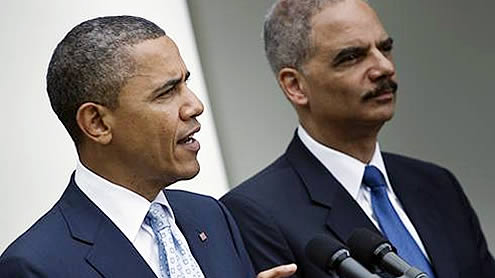President Obama’s decision Wednesday to assert executive privilege to shield his attorney general and the Justice Department from congressional investigators reignited a long-running Washington debate over the limits of White House power in which Obama has argued both sides.
In 2007, Obama, then a senator with higher ambitions, chided President George W. Bush for employing his executive authority to block then-senior White House adviser Karl Rove from testifying before Congress in a scandal involving the firing of nine U.S. attorneys. – Speaking to CNN host Larry King, Obama declared that the Bush administration had a tendency to “hide behind executive privilege every time there’s something a little shaky that’s taking place.”
Obama urged Bush to consider “coming clean,” adding that “the American people deserve to know what was going on there.” On Wednesday, his role had changed, but the debate was the same: Republican were asking what exactly Obama was trying to hide by invoking his right to executive privilege for the first time. The administration is refusing to turn over documents related to the Justice Department’s “Fast and Furious” operation, which involved the flow of illegal guns to Mexico. A House committee on Wednesday voted to find Attorney General Eric H. Holder Jr. in contempt of Congress for failing to turn over the documents. The answers to his critics’ questions could have broad implications for Obama five months before voters decide whether to grant him a second term. The expected protracted legal dispute has the potential to embarrass and distract the White House during the heart of the reelection campaign. Obama’s assertion of privilege quickly became fodder for his political opponents, who have latched onto the Fast and Furious scandal to accuse the president of trying to avoid congressional scrutiny.
Sen. Charles E. Grassley (Iowa), a senior Republican on the Judiciary Committee, sent a letter to Obama on Wednesday asking for more detail on the exact scope of the privilege that Obama invoked. Administration officials dismissed suggestions that the president’s action contradicted the position Obama held as a presidential candidate in 2007. They noted the administration already has handed over 7,600 documents to Congress and Holder has testified nine times. The documents in dispute are “deliberative process” memos that have traditionally been protected by Democratic and Republican administrations so that the White House staff can freely discuss sensitive matters without being influenced by the fear that their internal debates will be made public, administration officials said. White House spokesman Eric Schultz noted that Obama has shown greater reluctance to use executive privilege than his two immediate predecessors. Bush invoked the power six times and Bill Clinton 14, according to the Congressional Research Service.
But Mark Rozell, a public policy professor at George Mason University who has testified before Congress on executive privilege, said the question is not how many times the power is invoked but whether there is a legal justification. The Constitution does not mention executive privilege, said Rozell, who noted that courts have typically ruled that it applies in cases of vital national security interests. That might be the legal definition, but the political calculus for the White House is whether what Obama is seeking to keep private is more damaging to him than failing to publicly disclose the documents. “Every time a president claims executive privilege, it brings up memories of President Nixon’s abuses of that doctrine,” Rozell said. Not all claims of executive privilege hold legal water. Some of President Bill Clinton’s attempts to invoke privilege during grand jury hearings into his relationship with Monica Lewinsky were withdrawn or rejected in court. Rove eventually did testify on the firing of the U.S. attorneys, meeting with congressional leaders behind closed doors in 2009 — after Bush had left office.
Scott Coffina, a Bush administration counsel who is now in private practice, emphasized the need to safeguard “unvarnished” legal advice on policy matters. But he acknowledged that the documents in dispute could contain “significant information” that may explain why Holder reversed himself and declared the Fast and Furious program “fundamentally flawed” after initially standing by it. Washingtonpost













